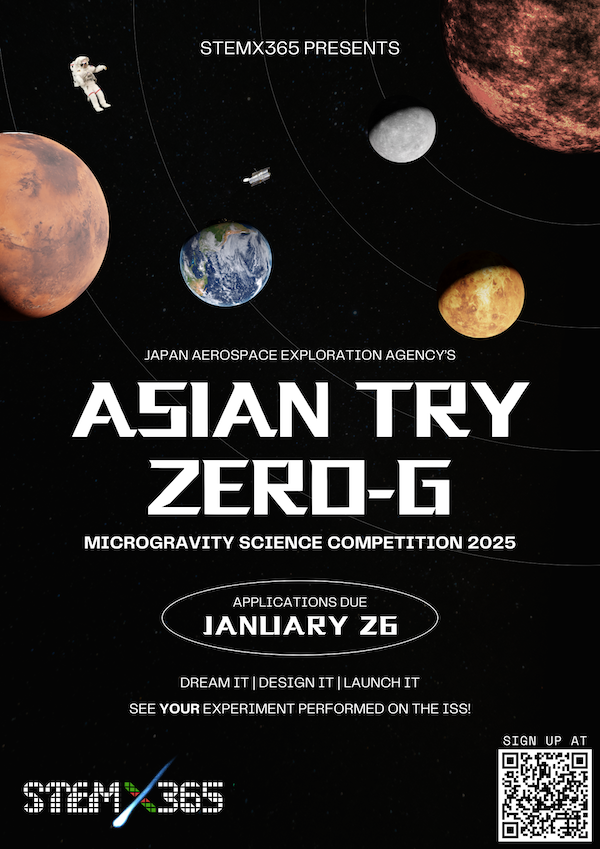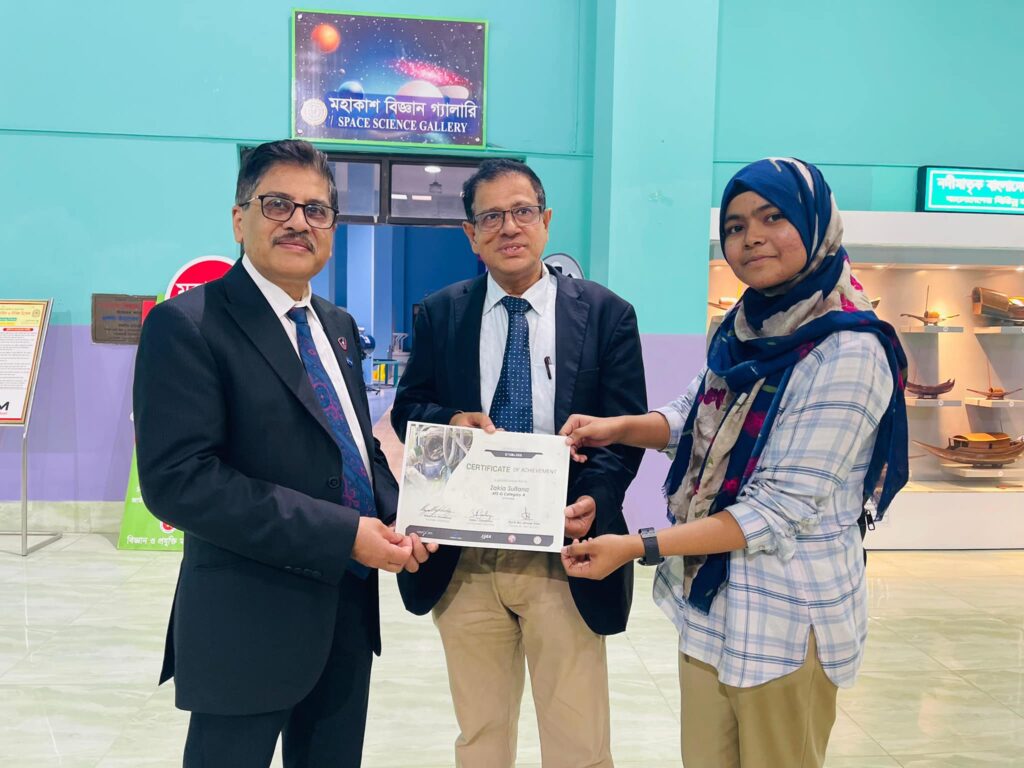Asian Try Zero G - 2025
Call for proposal
JAXA’s Asian Try Zero-G program is an initiative by the Japan Aerospace Exploration Agency (JAXA) that enables students and young researchers from Asia and the Pacific region to propose ideas for simple microgravity experiments. These experiments are performed aboard the International Space Station (ISS) by Japanese astronauts to demonstrate the effects of a microgravity environment.

Key Features of the Program:
Educational Focus:
Aims to foster interest in space science and technology among students and young researchers in the region.
Encourages creativity and critical thinking by allowing participants to design experiments.
Participation:
Open to individuals or groups from participating countries in Asia and the Pacific.
Proposals are typically submitted through national space agencies or designated organizations.
Experiment Demonstrations:
The experiments are selected based on feasibility, scientific value, and educational impact.
JAXA astronauts conduct the experiments on the ISS, often broadcasting them live or recording them for educational purposes.
Variety of Experiments:
Proposals usually involve demonstrating physical, chemical, or biological phenomena in a microgravity environment. Examples include fluid dynamics, motion of objects, or plant growth.
Promoting Collaboration:
Strengthens international collaboration by involving multiple countries in a shared learning experience.
Enhances regional interest in space-related activities.
Deatils
Proposals for simple physics experiments should focus on enabling visual confirmation of physical phenomena and include a hypothesis or foundation described as mathematically or logically as possible. For inspiration, you can review videos of previous ATZ-G experiments.
The experiments will utilize only items that are currently on orbit or re-flight items.
Download the manifest of available items here:
We invite proposals for entirely new experiments or for enhancing and improving previously conducted experiments. Please refer to the link below for examples of past experiments.
Students may participate either individually or as part of a group.
The experiment must be conducted within the Japanese Experiment Module (JEM) “Kibo.”
Proposals should avoid requiring specialized tools and must rely solely on items currently available on orbit, re-flight items, or those listed in the provided Manifest Download. These items can be combined as necessary.
The entire experiment must be completed within 10 minutes, with clear and concise procedures. Applicants may attach a supplementary video to their application forms.
While the experiment should ideally involve only one astronaut, proposals involving activities or exercises conducted by multiple crew members may also be considered.
The experiment will be recorded aboard the International Space Station (ISS) using high-definition cameras. These recordings, including high-resolution images and videos, will be downlinked to Earth and shared with the proposers.
Proposals aimed at financial gain for specific groups or organizations will not be accepted. Additionally, Asian Try Zero-G activities cannot be used for promotional purposes.
Other astronauts may perform the experiment as substitutes, depending on the availability and operational status of JAXA astronauts.
The number of proposals to be selected from all submissions has yet to be determined.
For additional information, click here.
Students, up to postgraduate, (individuals or teams) must be enrolled in schools in Kibo-ABC countries/region (1) that are participating in Asian Try Zero-G (2).
(1) Kibo-ABC Member countries/region (in alphabetical order) Australia, Bangladesh, Indonesia, Japan, Malaysia, Nepal, New Zealand, Republic of the Philippines, Republic of Korea, Singapore, Taiwan, Thailand, United Arab Emirates, Vietnam.
Kibo-ABC URL: https://humans-in-space.jaxa.jp/en/biz-lab/kuoa/
(2) Asian Try Zero-G 2025 Participating countries/region (as of November 2024) Australia, Japan, Malaysia, Republic of the Philippines, Singapore, Taiwan, Thailand, United Arab Emirates. Participation from other countries is being coordinated. Please check the official website for the latest participating countries/region.
Asian Try Zero-G: https://humans-in-space.jaxa.jp/en/biz-lab/kuoa/tryzerog/
Call for proposals: Early November 2024
First selections in Australia: January 26, 2025
Final selection by JAXA: March 2025
On-orbit experiment: December 2025 – February 2026 (Dates TBA)
Wrap-up session: May 2026
Please note: Schedule may change without prior notice. On orbit experiment date to be determined by the on-orbit schedule.
Certain experiments may be deemed hazardous or impractical aboard the International Space Station (ISS) or within the Kibo module. These limitations often stem from safety concerns or operational restrictions related to astronaut activities. When proposing an experiment, please keep the following in mind:
A) Unsafe practices on the ISS/Kibo include:
Using hazardous materials or objects.
Releasing a large volume of water (e.g., 1 liter or more) into the Kibo module.
Emitting gases that the ISS cannot adequately process or dispose of.
Dispersing small particles like powders, bolts, nuts, or paper fragments.
Utilizing high-speed, large-mass spinning objects.
Handling fragile items (e.g., glass).
Using items with sharp edges that pose a risk of injury.
B) Impractical practices on the ISS/Kibo include:
Requiring extensive astronaut time for the experiment.
Compromising astronaut privacy or rights.
Needing prolonged airflow termination within the cabin.
Obstructing emergency evacuation routes, such as by closing hatches.
Please design your proposal with these considerations in mind to ensure feasibility and safety.
Kindly review the Example Proposal and complete the details in the downloadable Proposal Form as follows:
Applicant Affiliation
Title
Summary of the Proposed Experiment
(Approximately 200 words, including background, objectives, experimental process, anticipated results, discussion, etc.)
Hypothesis/Theory
a. Hypothesis
b. Schematic Diagram
c. Mathematical/Theoretical Basis or Scientific Rationale
Required Items for Implementation
Experiment Procedure
(Please include an estimated timeline for each step.)
Optional: Photo of the Applicant
(If you wish to be included in a commemorative photo with the astronaut, your photo will be sent to the ISS and a photo taken in Kibo with the astronaut(s). Note: The photo will be publicly shared.)
Please ensure your explanations of hypotheses, theories, and experimental procedures are clear and easy to follow, using diagrams and supplementary videos where needed. If you submit a video, rename the file to match the name of your experiment.
Applicants must acknowledge and agree to the following terms:
1. Management of Submitted Proposals
a) JAXA reserves the right to modify submitted ideas, implement activities in space, and use the resulting outcomes for public and educational purposes.
b) Images and visuals included in submitted proposals will be published on JAXA’s website and may be used for public and educational purposes.
c) Even if a submitted idea is not executed in space, JAXA retains the right to use the proposal for public and educational purposes.
d) If any requirements are not met, JAXA reserves the right to withdraw acceptance, even after the idea has been approved as a proposed experiment.
2. Privacy Policy
Personal information collected through this application will be used exclusively to notify applicants about selection results, publications, and project-related events. Videos and photos taken during the program may be made publicly available.
3. Applicant Responsibility and JAXA’s Liability Waiver
JAXA will not be held responsible for any issues that arise during program participation. Applicants are fully responsible for resolving any such issues independently.
Zakia Sultana's Experiment on ISS
Zakia Sultana’s remarkable journey inspires students worldwide! Her experiment, submitted for the Asian Try Zero-G 2023, was approved by JAXA and successfully conducted aboard the International Space Station (ISS) with the support of an astronaut. This incredible achievement highlights the opportunities available to Bangladeshi students through STEMX365, which facilitated her participation in this prestigious program. Zakia’s accomplishment is a testament to determination, innovation, and the boundless possibilities of space science. Let her story inspire aspiring scientists to reach for the stars!



